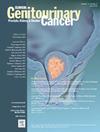Immune Checkpoint Blockade Therapies Efficacy and Toxicity in Patients With Impaired Renal Function in Metastatic Bladder Cancer
IF 2.3
3区 医学
Q3 ONCOLOGY
引用次数: 0
Abstract
Background
In this study, we reported the real-life results of data from impaired renal patients with urothelial carcinoma who were treated with ICTs.
Methods
The patients were categorized into 3 different groups GFR ≥60mL/min (normal), 60mL/min-30mL/min (low), and less than 30 mL/min (very low) based on GFR. The primary endpoints were the overall response rate (ORR), overall survival (OS), duration of response with ICT, and safety. Median follow-up and OS were estimated by using the Kaplan-Meier method.
Results
One hundred-five (60.3%) of patients were GFR normal, 26.4% were GFR low with 30mL/min-60mL/min, and 13.2% were very low group. ORR for GFR normal, low and very low groups were 36% (n = 38), 26% (n = 12) and %31 (7); P = .2, respectively. The median duration of response for GFR normal, low and very low groups were 47.2 months (95% CI, 24.5-51.4), 33.1 months (95% CI, 26.9-47), and 23.5 months (95% CI, 12.2-43.7); P = .01, respectively. The Median OS rate for GFR normal, low and very low groups were 11.9 (7.2-16.5) months, 4.7 (1.8-7.7) and 6.8 (1.1-13.6) months, P = .015, respectively. In addition, GFR <60 ml/min HR = 1.6; 95% CI 1.12-1.80; P = .02, maintained a significant association with OS in multivariate analysis.
Conclusions
Long-term follow-up of real-world data confirms that the overall survival rate and durable response rate with ICT were higher in patients with GFR >60mL/min. On the other hand, we demonstrated that ICT was effective and a durable response seen in a group of patients with renal inpairement who did not have an effective systemic treatment option.
免疫检查点阻断疗法在肾功能受损的转移性膀胱癌患者中的疗效和毒性
背景在这项研究中,我们报告了肾功能受损的尿路上皮癌患者接受信息通信技术治疗的实际结果:根据 GFR 将患者分为 GFR ≥60mL/min(正常)、60mL/min-30mL/min(低)和小于 30 mL/min(极低)三组。主要终点是总反应率(ORR)、总生存期(OS)、ICT反应持续时间和安全性。中位随访时间和OS采用Kaplan-Meier法估算:结果:15 名患者(60.3%)的 GFR 正常,26.4% 的患者 GFR 较低,在 30mL/min-60mL/min 之间,13.2% 的患者 GFR 很低。GFR正常组、低组和极低组的ORR分别为36%(38人)、26%(12人)和%31(7人);P = .2。GFR正常组、低组和极低组的中位反应持续时间分别为47.2个月(95% CI,24.5-51.4)、33.1个月(95% CI,26.9-47)和23.5个月(95% CI,12.2-43.7);P = .01。GFR正常组、低组和极低组的中位OS率分别为11.9(7.2-16.5)个月、4.7(1.8-7.7)个月和6.8(1.1-13.6)个月,P = .015。此外,GFR对真实世界数据的长期随访证实,GFR>60mL/min的患者使用ICT的总生存率和持久应答率更高。另一方面,我们也证明了 ICT 的疗效,并在一组没有有效全身治疗方案的肾功能不全患者中看到了持久的反应。
本文章由计算机程序翻译,如有差异,请以英文原文为准。
求助全文
约1分钟内获得全文
求助全文
来源期刊

Clinical genitourinary cancer
医学-泌尿学与肾脏学
CiteScore
5.20
自引率
6.20%
发文量
201
审稿时长
54 days
期刊介绍:
Clinical Genitourinary Cancer is a peer-reviewed journal that publishes original articles describing various aspects of clinical and translational research in genitourinary cancers. Clinical Genitourinary Cancer is devoted to articles on detection, diagnosis, prevention, and treatment of genitourinary cancers. The main emphasis is on recent scientific developments in all areas related to genitourinary malignancies. Specific areas of interest include clinical research and mechanistic approaches; drug sensitivity and resistance; gene and antisense therapy; pathology, markers, and prognostic indicators; chemoprevention strategies; multimodality therapy; and integration of various approaches.
 求助内容:
求助内容: 应助结果提醒方式:
应助结果提醒方式:


